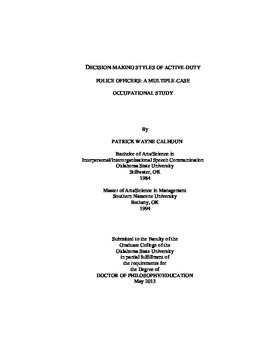| dc.contributor.advisor | Ausburn, Lynna | |
| dc.contributor.author | Calhoun, Patrick Wayne | |
| dc.date.accessioned | 2014-09-24T14:16:28Z | |
| dc.date.available | 2014-09-24T14:16:28Z | |
| dc.date.issued | 2013-05 | |
| dc.identifier.uri | https://hdl.handle.net/11244/10961 | |
| dc.description.abstract | Little is known about the decision-making styles of active-duty police officers or what the consequences of not understanding those decision-making styles may be. The purpose of the study was to describe the demographics and decision-making profiles of active duty police officers, as well as any relationships that may exist among these variables, and the effects of leadership training on decision-making styles. The general approach of this study involved a multi-case examination of quantitative data, both new and historical, regarding the decision-making styles of active duty police officers as determined by the General Decision-Making Styles (GDMS) survey. This research used a quantitative, comparative, multiple-case, descriptive design comprising three data sets. Results from two previous studies and a new study conducted for this research were analyzed to determine if a profile of decision-making styles emerged for those choosing an occupation as a police officer. An online questionnaire gathering demographic data as well as the GDMS responses were combined with an intra-departmental study and a study from research conducted in 2003. The study also examined the potential effects of leadership training for police officers on their measured decision-making style. The study was guided by six theoretical concepts: Adult Learning, Transfer of Training/Learning, Career Choice Models, Leadership Development, General Decision-Making Style, and Decision-Making in the Community Policing context. Analysis of the data revealed a strong relationship with those choosing a career in policing and the Rational decision making style. In contrast, a strong negative relationship also emerged with the participants and the Avoidant decision-making style. Research strongly indicates that decision-making styles may be situational but that the primary style will resist change and remain dominant in arriving at a decision. Since decision-making styles are unlikely to change with time or through intervention, it is important to consider using the GDMS as a screening tool for future police candidates. | |
| dc.format | application/pdf | |
| dc.language | en_US | |
| dc.rights | Copyright is held by the author who has granted the Oklahoma State University Library the non-exclusive right to share this material in its institutional repository. Contact Digital Library Services at lib-dls@okstate.edu or 405-744-9161 for the permission policy on the use, reproduction or distribution of this material. | |
| dc.title | Decision-making styles of active-duty police officers: A multiple-case occupational study | |
| dc.contributor.committeeMember | Cole, Belinda | |
| dc.contributor.committeeMember | Self, Mary Jo | |
| dc.contributor.committeeMember | Depperschmidt, Chad | |
| dc.contributor.committeeMember | Ausburn, Floyd | |
| osu.filename | Calhoun_okstate_0664D_12689.pdf | |
| osu.accesstype | Open Access | |
| dc.type.genre | Dissertation | |
| dc.type.material | Text | |
| thesis.degree.discipline | Occupational Education | |
| thesis.degree.grantor | Oklahoma State University | |
